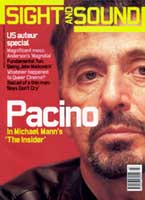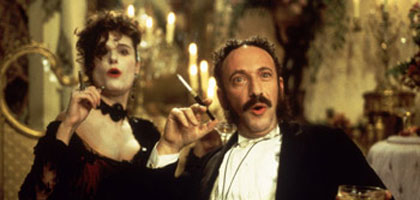
The Mike-ado
Film of the Month: Topsy-Turvy

He may have traded cardigans and scowls for crinolines and arias, but Topsy-Turvy is still very much a Mike Leigh film
Imagine how startled you'd be to discover that Krzysztof Kieslowski had secretly made a series of knockabout comedies (Three Colours: Nurse, Three Colours: Camping and Three Colours: Up the Khyber) or that Martin Scorsese's next picture was to be set in an antique shop in Chipping Sodbury. Multiply that surprise a hundredfold and you'll be half way to grasping the shock value of Tospy-Turvy. It's a "Mike Leigh film", but you'll scan the screen in vain for the images and sounds that phrase conjures up. Instead of tragi-comically half-articulate people in questionable cardigans, Topsy-Turvy - an account of a few key years in the career of the popular English operetta team Gilbert and Sullivan and their circle - offers lavish period costumes and screeds of florid dialogue. Leigh the poet of the underclass seems to have been replaced by Leigh the reveller in middlebrow theatrics. Mike the minimalist has delivered a film which frequently merits the adjective 'rollicking'. Has the man who I'd insist was Britain's greatest living film-maker defected to that most reprehensible of tendencies, heritage mongering?
Mercifully not, though there are a few stretches in this overlong film where he teeters on the brink. Leigh's appetite for the music is evidently immense, resulting in too many indulgent performances of their songs. Yet there's still plenty here to satisfy Leigh devotees, if they can peer past the aspidistras. The staging is as rich and complex as one would expect, there is the typically judicious balance of heartbreak and farce, and there are several diamond-sharp moments when an apparently casual observation illuminates a whole architecture of social assumptions.
Nonetheless, the film marks an inarguable departure. Leigh is dealing with real historical figures, flirting with traditional genres (the biopic, the backstage musical, the dreaded heritage movie), and shedding his trademark heightened naturalism for a full-blooded plunge into thespian excess. Theatricality is not just the hallmark of the film's method, it forms one of its principal subjects. This allows Leigh (who is also, let's not forget, a seasoned stage director) and his actors to have great fun recreating a world of backstage bitching and production politics while simultaneously indicating how people's egos, health and relationships suffer in such a hothouse atmosphere. Timothy Spall's performance as the ageing star Richard Temple, for example, is a perfectly judged study of juxtaposed fragility and bombast. Throughout the film, Leigh contrasts on-stage polish with private insecurity, the latter manifesting itself in alcoholism, drug dependency and dangerous levels of vanity.
He's also keen to explore the dynamics of creativity, setting the happily repetitive librettist Gilbert (Jim Broadbent) in conflict with composer Sullivan's loftier ideals. Gilbert finds it both perplexing and hurtful that Sullivan (Allan Corduner) wishes to dispense with a hit formula, while Sullivan, anticipating the Woody Allen of Stardust Memories, is terrified of being so seduced by a profitable rut he might never fulfil his true potential. This tension between them is so fundamental Sullivan's abrupt and underexplained change of heart to embrace The Mikado strikes one of the film's few false notes. It's tempting to speculate how their dispute relates to Leigh himself. Following the huge success of Secrets and Lies (after which Career Girls, for all its deft pleasures, did little more than mark time), should he choose a Gilbertian path of more-of-the-same, or follow Sullivan towards ambition and risk? In such a context, Topsy-Turvy's unexpected lurch into costume territory seems a bold move, paradoxically lending a dash of daring to this usually ultra-conservative format.
On the surface, Leigh's script urges us to root for Sullivan, not so much because he is particularly admirable but because Gilbert is such a buffoon. Broadbent, however, is so magnificent as Gilbert we can see beneath the gruff foolishness of the facade to the emotionally stunted man underneath. The son of two clearly deranged parents and the husband in a stilted marriage, Gilbert clings to his formulaic writing because formulas offer certainty, a certainty unattainable in the destabilising realm of emotions.
This fear of feeling provides the film with an emotional climax that's one of the greatest scenes in any Leigh film, as Gilbert's wife Kitty (Lesley Manville, hitherto underused) finally, if obliquely, confesses her longing for children. Gilbert listens as she hovers on the edge of a breakdown but can offer her nothing but bluff masculine evasion. The English dread of open emotion is one of Leigh's abiding obsessions (it forms the core of his excruciatingly precise first film Bleak Moments), and his ability to locate it even here, amid all those galumphingly good-humoured songs, is another reason why Topsy-Turvy is more than just another costume outing.
It's this attention to the anxious underbelly of Victorian culture that does most to save Topsy-Turvy from descending into pictorialism. The film leaves us in no doubt that 19th-century England was a society founded on sexual hypocrisy and funded by imperial exploitation. The first threads through the film in various guises: Sullivan's trips to overseas brothels, the Gilberts' barren marriage, the fine lines actresses must tread between propriety and scandal, the repression and hysteria in the home of Gilbert's mother and unmarried sisters. Imperialism emerges in the unadorned racism prompted by the news of General Gordon's defeat at Khartoum and the greedy appropriation that twists the nuances of Japanese culture into the slant-eyed pantomime of The Mikado.
There are other, more tantalising asides which further underline how the gathering momentum of modernity was unsettling the texture of the times. A running joke concerns the impact of new-fangled technologies such as the electric doorbell, the fountain pen and the telephone, but it's a joke with darker implications about how older ways of communicating were being sidelined. There is the brief journey Gilbert makes through the poverty-stricken streets that lie just beyond the Savoy Theatre; and there are enough hints of queer undercurrents in the backstage milieu to remind us that the Oscar Wilde trial was only a few years away.
These social comments are never crassly driven home, but they resonate strongly in the mind afterwards. That's how Leigh works best, since when he peddles undisguised propaganda the results can be as thin as the one-dimensional Thatcher-bashing which marred High Hopes. Topsy-Turvy, like Life Is Sweet or Meantime, steeps you in a culture so deeply it's only by looking back and peering closely you can detect how wider forces have cruelly impinged on individual lives. In that sense, despite its initially disorienting costume trappings, It's very much "a Mike Leigh film" after all.
